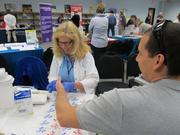Influenza Update
Monmouth County is still in the midst of a very serious flu season. February saw a sharp spike in reported cases throughout the
state. The Monmouth County Health Department (MCHD) continues to provide flu
shots. Contact our office to schedule an appointment. For additional information and reports, visit the NJDOH’s Seasonal Influenza page.
Howell Health Fair
 The MCHD will be holding a health fair on
Saturday, April 21, from 9 a.m. to 1 p.m., at the Southard School 115 Kent Road
in Howell (Get directions). There will be information on staying healthy,
activities and programs available through the MCHD, free screening for eyes,
diabetes, cholesterol, body mass index, blood pressure and other screenings and
information available. For additional information, contact our office at
732-431-7456.
|
World Health Day - Health for All
World Health Day is Saturday, April 7 and this year's focus
is the topic of Universal Healthcare. At least half of the world’s population is
currently unable to obtain essential health services.
In order to pay for health services, almost 100 million people
are forced to survive on just $1.90 or less a day. Over 800 million people spend at least 10
percent of their household budgets on health expenses. Incurring catastrophic expenses for health
care is a global problem. Visit http://www.who.int/campaigns/world-health-day/2018/en/ to learn more.
T-dap Vaccines Available
The MCHD provides T-dap
immunizations throughout the year by appointment. Immunizations are free for Board of Health member towns; all others are $15.00. Call our
office at 732- 431-7456 ext. 8513 to schedule an appointment. The CDC recommends that grandparents be
vaccinated against whooping cough (pertussis) tetanus
and diphtheria, ideally at least 2 weeks before visiting newborns.
Mammography Clinic
The MCHD provides free or low-cost cancer screenings to uninsured women living in Monmouth County. We will be holding a clinic on Thursday, May 3, from 9 a.m. to 3 p.m. Call 732-431-7456 ext. 8513 for more information.
Hoarding – Facing the Challenges
One of the most challenging areas of county/municipal
response is hoarding.
Hoarding is the persistent difficulty of discarding
or parting with possessions, regardless of their actual value. This behavior usually has deleterious
effects—emotional, physical, social, financial, and even legal—for a hoarder
and family members.
Compulsive hoarding is
sometimes considered to be a type of OCD. Compulsive hoarding is also considered a feature of obsessive compulsive
personality disorder (OCPD) and may develop along with other mental illnesses,
such as dementia and schizophrenia.
A lack of functional living space is common
among hoarders, who may also live in unhealthy or dangerous conditions.
Hoarders often live with broken appliances and without heat or other necessary
comforts. They cope with malfunctioning systems rather than allow a qualified
person into their home to fix a problem.
Frequently the hoarder lacks the financial
resources and the will to adequately address their problem. Traditional enforcement procedures (summons,
mandatory court appearance and the imposition of fines by a municipal court) do
not address the underlying issues and therefore fail to achieve any kind of
ongoing compliance.
Similarly, attempts by family and friends to help with
de-cluttering may not be well received by the person who hoards. Until the
person is internally motivated to change they may not accept help, for at the
end of the day, motivation cannot be forced. Everyone, including people who
hoard, has a right to make choices about their objects and how they live.
Enforcing officials balance this right against the health and safety of the
community. Generally, hoarding does not become enforceable until it affects the
surrounding neighborhood.
Attempts
to “clean out” the homes of people who hoard without treating the underlying
problem usually fail. Families and community agencies may spend many hours and
thousands of dollars clearing a home only to find that the problem recurs,
often within just a few months. Hoarders whose homes are cleared without their
consent often experience extreme distress and may become further attached to
their possessions. This may lead to their refusal of future help.
Successfully
addressing a hoarding condition requires an individual approach from a number of
related agencies. In an effort to deal with this complex issue, some states
have formed Hoarding Response Teams composed of health and police departments, mental health professionals, code and fire officials and sometimes animal control officers, among others. Hoarding
requires patience and understanding from all the involved parties.
Attributions to:
International OCD Foundation
Anxiety and Depression Association of
America (ADAA)
 |
|
To date, the MCHD's team of Public Health Nurses have provided over 900 seasonal
influenza (flu) vaccinations for the 2017-2018 Influenza Season. |
|